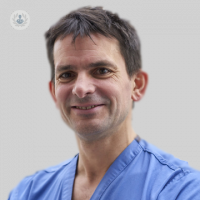Don’t get caught short when it comes to breathing
Written in association with:Shortness of breath can be caused by several issues within the body, but what about when it’s related to the heart?
Top consultant cardiologist Dr Julian Collinson speaks to us about shortness of breath when it’s connected to heart conditions, in this informative article.

What does shortness of breath most commonly indicate?
Shortness of breath is a pretty broad symptom. It can represent a number of things. From my perspective, obviously the most important part is the heart, but it can also reflect problems with the lungs, and occasionally anaemia and so on. It's a very broad symptom that can have a large number of causes.
When should I see a doctor for shortness of breath?
The key time to see your doctor is, if things are changing. So, if you become shorter of breath, for example going up the stairs, or coming out of the tube station then that's time to start thinking about it. Obviously if things change very quickly overnight, that's an important sign. Sometimes it can be more subtle and come on over a period of days or weeks.
Essentially, if you're shorter of breath than you expect for your level of fitness, you should probably see a doctor and just make sure everything is fine.
What tests will I undergo to determine the cause of my shortness of breath?
The first thing to do when your doctor sees you about shortness of breath, is to have a talk where they take a history, and try and understand if there's any particular reason why this might be the case. That might define which investigations are the most important.
In general terms, there will be some blood investigations, for example to look if there's any evidence of anaemia. From the heart perspective, the tests that are done are:
- An ECG, which is a simple heart tracing;
- An echocardiogram, which is an ultrasound of the heart.
There are various other investigations that are maybe necessary to see if there's anything more subtle going on. If the main causes are felt to be a lung or respiratory cause, then you may well have a chest X-ray, or some lung function tests to have a look at how the lungs are working.
How is shortness of breath managed?
The main management of shortness of breath is to treat the cause. If the cause is something to do with the heart pump failing, so heart failure, then the usual treatment for that is medication. There is probably a half a dozen of different types of tablets that can be used in this situation, and they're extremely successful in managing the symptoms in this particular situation.
Clearly, identifying the cause and treating the cause is also important so, for example if the main cause is shortness of breath is to do with a valve problem with the heart, then various procedures might be necessary to try and replace the valve.
When the underlying cause is determined, what happens next?
Once the underlying cause is found, then maybe, for example, if it's anaemia you may need to do more investigation as to determine why that's happened. If it's to do with heart failure, then usually there'll be some investigations to find out whether it's to do with problems with narrowing of the arteries or a heart valve problem, and those causes are treated.
Sometimes, the cause of heart failure and shortness of breath in a cardiology context is to do with weakness to the muscle of the heart. Often, that isn't completely reversable and something that would require medication, which usually will be for the long term.
Do you have shortness of breath, and are concerned it’s related to a heart condition? Arrange an appointment with Dr Collinson via his Top Doctors profile.


